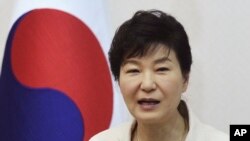A senior official in Seoul Thursday announced that South Korean President Park Geun-hye will travel to Beijing for celebrations marking the 70th anniversary of the end of World War II, but it remains unclear if she will attend a high-profile military parade in Beijing.
Ju Chul-ki, a senior presidential secretary for foreign affairs in Seoul, told reporters that President Park will travel to China on September 2 for a three-day visit that may include a summit or private meeting with Chinese President Xi Jinping. But he said it has not yet been decided whether or not the South Korean president will attend the memorial parade that some observers have said could be used to disparage Japan for its wartime past and showcase China’s military arsenal.
"Details are still under review at this point,” Ju said.
Russian President Vladimir Putin is expected to attend the Chinese celebrations, though many Western leaders are hesitant to participate due to concerns about the military overtones of the event.
The European Union's ambassador to Beijing, Hans Dietmar Schweisgut, recently said the planned display of military might raises questions “about whether the event will encourage reconciliation or further stir resentment.”
Increasing tensions with China over its aggressive military moves in the South China Sea, concerns that Beijing will use the event to shame Japan, and memories of Beijing’s 1989 brutal suppression of China’s pro-democracy movement in Tiananmen Square have also made many leaders reluctant to participate in a military parade on the same location.
Washington has not announced if any American officials will attend nor even acknowledged if an invitation from Beijing was received.
The South Korean leader may have mixed feelings about attending Beijing’s military parade. Even though both countries suffered under Japanese colonial rule until the end of WWII, China later fought against the U.S.-allied South and supported the Northern Communist forces during the Korean War.
President Park’s decision to attend the Beijing celebration reinforces her efforts to nurture a positive relationship with China, South Korea’s largest trading partner. South Korea signed a free trade agreement with China in 2014, and joined the China-led Asian Infrastructure Investment Bank (AIIB) earlier this year.
Seoul at the same time is trying to balance its outreach to Beijing with maintaining its strong military alliance with Washington. In 2014, South Korea and the U.S. agreed to extend American control over joint forces in South Korea due to concerns over North Korea’s growing nuclear and missile threats. The two allied forces are currently involved in joint military drills.
Robert Kelly, a Korea analyst at Pusan National University in South Korea, said Park’s outreach to Beijing is not a tilt away from Washington but part of a long-term strategy to undermine the Sino-North Korea relationship.
“If we can pull China away from North Korea then North Korea stands on its own and it will hopefully at one point finally collapse, so that’s what this is really about,” said Kelly.
Kelly said the message she is sending through personal diplomacy and increased economic ties is that an eventual unified Korea under Seoul’s leadership will be a stabilizing and peaceful regional presence.
It's not known if North Korean leader Kim Jong Un will attend the Chinese ceremonies. If he attends, it would be his first known travel outside the country since taking power upon the death of his dictator father, Kim Jong Il, in late 2011.
VOA Seoul Producer Youmi Kim contributed to this report.





